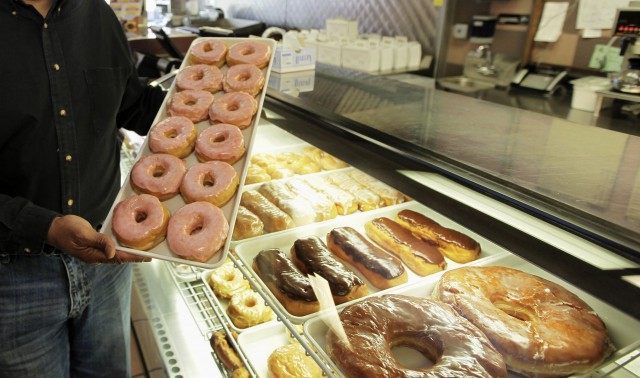JERUSALEM — Time Magazine unearths the history behind Jews and doughnuts, the traditional food consumed during the festival of Hanukkah. Today in Israel, more people eat doughnuts on Hanukkah than fast on Yom Kippur.
Emelyn Rude, a food historian and cookbook author, examines the origins of eating the fried treat on the festival of lights. Most people attribute the custom of eating doughnuts to the fact that Hanukkah celebrates the miracle of oil – wherein a jug of oil sufficient for a single night lasted for eight nights – but that isn’t the whole story, Rude explains. After all, jelly doughnuts didn’t exist at the time the Hanukkah story took place.
The etymology of the word sufganiyah (Hebrew for doughnut) comes from the Greek “sufan” meaning “dough” or “fried.” The Arabic “sfinj” is also the word for deep-fried doughnuts that have been eaten for centuries by North African Jews during Hanukkah. Even today, many Moroccan Jews continue to make sfinj to commemorate the festival.
But while sfinj was sweet, it was never filled with jelly. That tradition began in central Europe around the 16th century. According to historian Gil Marks, the first recorded recipe for a pastry akin to a jelly doughnut can be found in the 1532 German cookbook “Mastery of the Kitchen.”
From there the treat quickly spread throughout Europe and an assortment of nations adopted the confection to mark various holidays. Today, Germans eat Berliners on New Year’s Eve for good luck, while the Pennsylvania Dutch commemorate Fat Tuesday with fried fassnachts and the peoples of Latin America and Spain enjoy buñuelos on Christmas. Polish Jews began eating jelly-filled doughnuts – called ponchiks – for Hanukkah.
But it wasn’t until the 1920 establishment of the Histadrut – the national labor union – in Palestine that the sufganiyah became a symbol of Hanukkah. According to Rude, the sufganiyah became prevalent because of the amount of jobs it created. Today, the sufganiyah is so widespread in Israel that more Jews eat them than fast on Yom Kippur, the holiest day of the year.
For each day of the festival, the Israel Defense Forces purchase more than 50,000 doughnuts as a morale-boosting measure. More than 18 million sufganiyot are consumed in Israel during the period surrounding Hanukkah, which averages out to over three doughnuts per citizen.

COMMENTS
Please let us know if you're having issues with commenting.